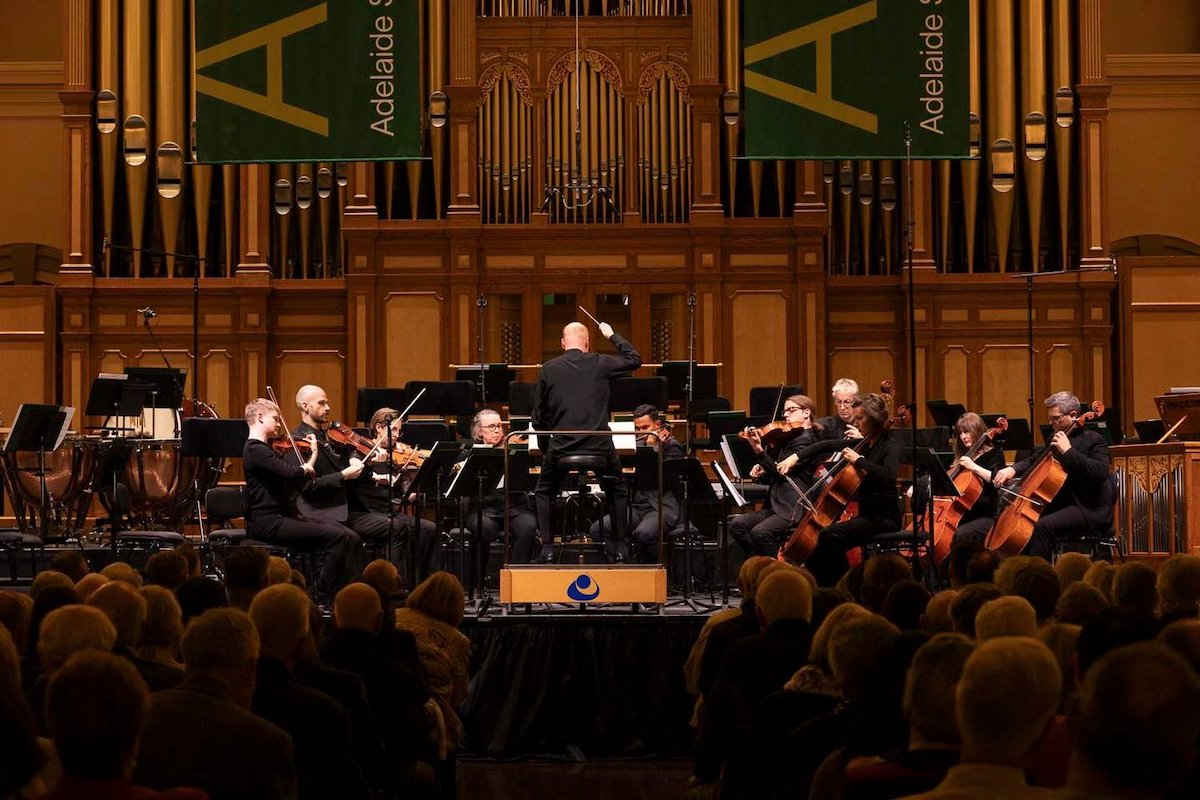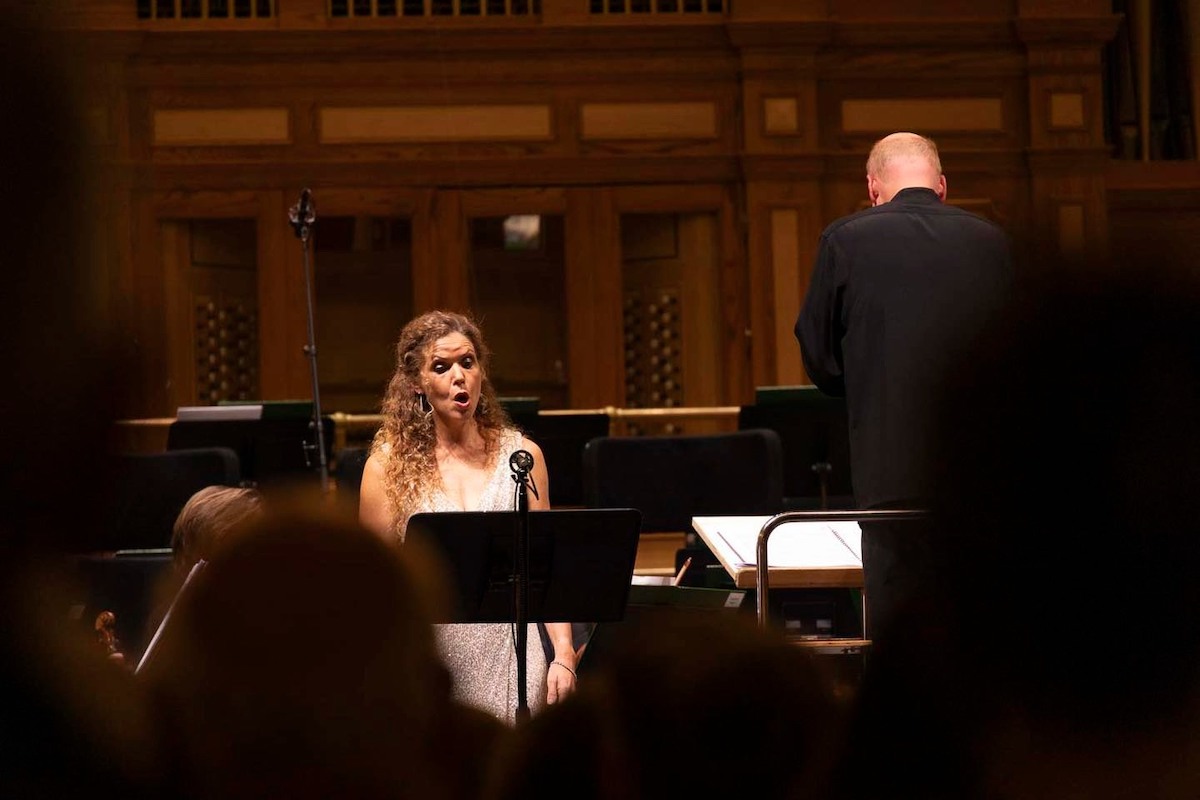The first two works of this intriguing and delightful ASO program are chamber works composed nearly 300 years apart.
Bulgarian born, London-based Dobrinka Tabakova’s (b. 1980) Barbican Glade (2022) was commissioned to celebrate the 40th anniversary of London’s majestic Barbican Centre, the largest arts and conference venue in the UK and home to the Guildhall School of Music and Drama where Tabakova studied.
The Barbican centre is a massive concrete structure in the brutalist architectural style that was the fashion of the day, but it features gardens that soften its appearance and a conservatory with 2000 tropical plant species. The multifaceted character of the centre seems to permeate Tabakova’s composition.
Performed by a string ensemble of three violins, three violas, three cellos and double bass, Barbican Glade opens quietly and slowly before a complex interplay of competing melodic lines, sometimes in different rhythms, emerges. Its character seems internally focussed rather than celebratory, and it has a wistful feel, with moments of stark dissonance.
Evidently, Tabakova’s work draws on elements of Elgar’s cello concerto and Beethoven’s fourth piano concerto which were performed at the Barbican’s opening. The music is simultaneously harsh and gentle, perhaps a personal reflection on the physical environment of the composer’s “home”, and possibly a broader metaphor for life.

Adelaide Symphony Orchestra: Grandeur. Photo © Shane Reid
Johann Sebastian Bach’s Cantata No. 51 Jauchzet Gott in allen Landen! (“Exult in God in every land”) BWV51, c1730, opens with a dazzling passage for piccolo trumpet by ASO principal David Khafagi. Soprano Sara Macliver then enters with an answering passage, and while the pairing of the piccolo trumpet with the soprano voice seems unusual, it works wonderfully.
The Recitative Wir beten zu dem Tempel an is gracious and heartfelt. Macliver is brilliant, singing with power and grace, and in the reflective Aria Höchster, mache deine Güte, her passionate voice is gently accompanied by cello, double bass and chamber organ. The Aria Sei Lob und Preis mit Ehren and the final Alleluja! are performed without a break, with the piccolo trumpet announcing the Alleluja, and returning to the exultation of the bright opening movement.

Sara Macliver and conductor Stephen Layton, Adelaide Symphony Orchestra. Photo © Shane Reid
The ASO’s inaugural Emerging Composer in Association Jakub Jankowski’s Before the Law was commissioned by the ASO and this was its premiere performance.
Jankowski’s composition is a setting of Franz Kafka’s Before the Law (1915), which the author described as a parable. Kafka’s page-and-a-half long text tells the story of a man from the country who wishes to enter “the law”, which is assumed to be an imposing building, but is prevented by an implacable doorkeeper who advises that he may be admitted later. The man waits, later trying unsuccessfully to bribe the doorkeeper who takes everything the has, and he spends the remainder of his life waiting in vain.
The man’s motives are never stated and “the law” remains an abstract notion — something to be attained but unknowable. A possible interpretation is that the parable critiques the rigidity of the law and bureaucracy and questions the notion of justice. Alternatively, the doorkeeper might be St Peter. More broadly, it can be read as a metaphor for life itself.
The Law is scored for a full orchestra, including a wide range of percussion instruments, an electronic keyboard, and various effects, including the use by the harpist of a friction mallet to rub the harp’s strings.
Jankowski uses an abridged version of Kafka’s parable as the text, which is set for three characters — the man, the doorkeeper and the narrator — and all three are sung by a single soprano voice. The lines for the doorkeeper are shouted through a megaphone and accompanied by thunderous percussion, evoking the doorkeeper’s immense and controlling power.
As the man dies, the doorkeeper concludes the parable with:
“No one else could ever have been admitted here, since this entrance was intended for you alone. Now I am going to close it.”
Macliver then slowly walks from the stage, still holding the megaphone to her mouth, and then the music gently fades out to finish with soft bell-like sounds, suggesting the eternity of death. (The parallel between God’s trumpet and the megaphone seems obvious, though is presumably unintended.)
Jankowski’s choice of the soprano voice is inspired and his writing for it is superb. Macliver thrives in this work, creating all the drama and mystery of Kafka’s enigmatic story, and she demonstrated great versatility in this concert. Jankowski’s The Law is a marvellous composition that must be heard again.
The final work was George Frideric Handel’s Music for the Royal Fireworks (HWV 351), of 1749, written in the time of King George II to celebrate the end of the War of Austrian Succession. Originally scored for a large band comprising – at the King’s request – only winds, brass and percussion, Handel later added strings and turned it into an orchestral suite for concert performance.
Once again, the thrillingly regal sound of the piccolo trumpet fills the auditorium in the joyous opening Ouverture. This movement is followed by the dancing interplay of strings and winds in the second Bourrée movement and then the sweet La Paix, Largo alla Siciliana. The glistening La Réjouissance, Allegro fourth movement recalls the bright fanfare of the opening, and two minuets complete the work.
This ASO concert showcased two Baroque masterworks and two excellent and thought-provoking contemporary works, and the ASO is to be thanked for its encouragement of young composers.











Comments
Log in to join the conversation.